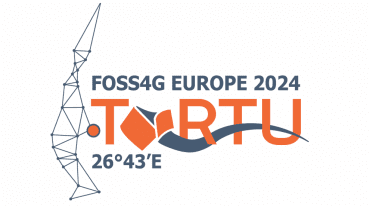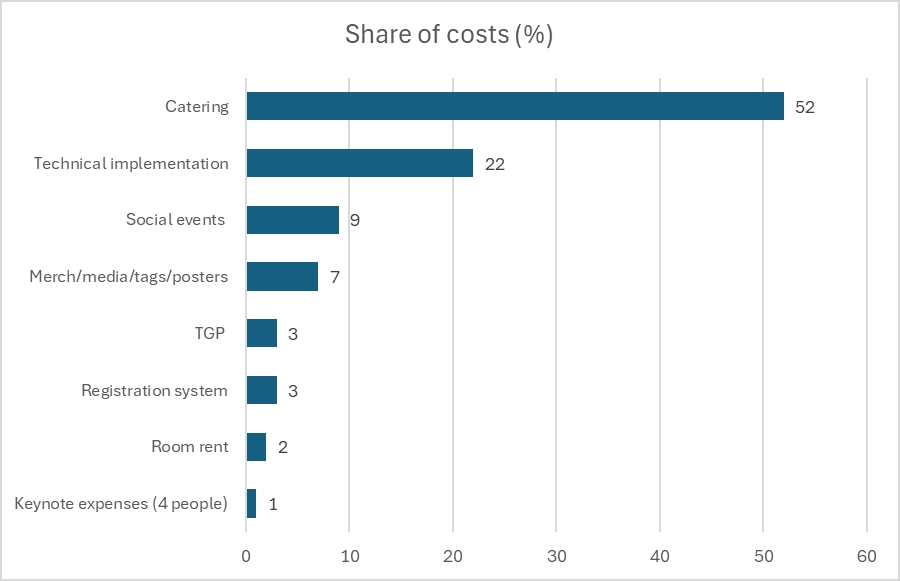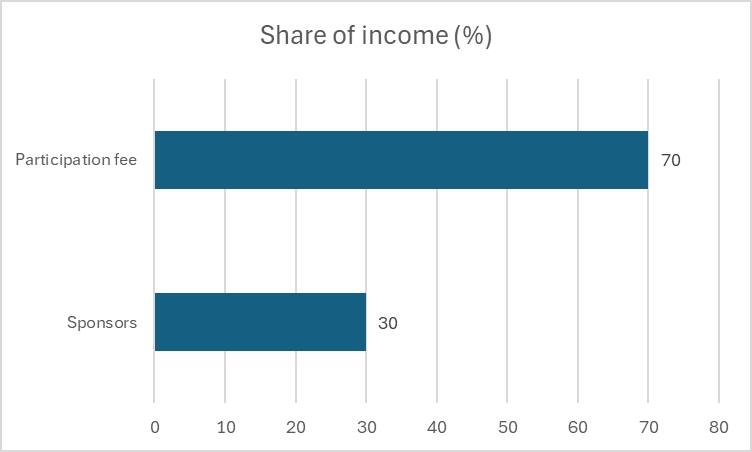FOSS4G-Europe-2024
FOSS4G Europe 2024 will be in Tartu, Estonia during 1-7 July 2024. Official website is https://2024.europe.foss4g.org.
Initial Proposal
FOSS4G Europe 2024 proposal pdf and proposal mail resent to Conference-Europe + conference_dev mailinglists at https://lists.osgeo.org/pipermail/conference-europe/2023-March/000651.html
Organisation
Program
Wrap-up
The following graph (by Merli Neito) shows the shares of expenses by category in the final books for FOSS4G Europe 2024
Some things to note here:
- catering covers all food expenses as (with the exception of Ice-Breaker) the catering services were provided by the same company. The rough breakdown within the Catering category is 25% of catering costs to Ice-Breaker, 25% to Social Bytes, 50% to five days of lunches and coffee-breaks (Monday-Friday). Catering for B2B and community sprint is there (needs attention if you're planning an event), but the cost for them is insignificant compared to all other catering costs.
- technical implementation covers both streaming/recording/video processing as well as needed audio-visual equipment rental (e.g. B2B meeting, gear for Zetod concert during Social Bytes)
- social events the costs associated are with room rental, performer paycheck
- merch/media/tags/posters banners around the buildings, participant name tags etc
- registration system fixed percentage fee to the registration/ticketing system
- room rent room rental is lower than what it could be because courtesy of the University of Tartu we could use the main venue (Van 46) free of charge.
- keynote expenses expenses associated with covering keynoters travel and accommodation
We had a total of 439 registered participants, out of whom 92 did not pay for their registration monetarily BUT contributed in some other significant way. For example we offered free-of-charge registration to the conference for our keynote speakers, workshop leaders, travel grantees, volunteers, and LOCers. Also, depending on the sponsorship level, each sponsor was eligible for N amount of free tickets.
Dividing the overall cost of the event with the number of attendees we end up with
- ~300 EUR per attendee, and
- ~375 EUR per paying attendee
Keeping in mind the ticket prices at 250 EUR for Early Bird, 390 EUR for Regular (prices off FOSS4GE 2024 homepage), and that we ended up with only 10 Regular registrations (because the ticket shop was closed early before the Early Bird sales end as we ran into capacity problems), without the workshop ticket sales (30 EUR Early Bird / 50 Regular per piece) and the gracious response from the FOSS4GE 2024 sponsors, the event would never have been self-sufficient at the ticket prices we had. Though again, in the case of imminent not-making-ends-meet we would have had to make choices about tuning down on the bling from the social events by either changing the format or the concept/location for them, and maybe skip recording and / or streaming the presentations altogether as most of the other categories are more or less must-haves without going into changing the whole format of the event. E.g. instead of providing lunch on site, we could have directed attendees to local caffees and restaurants which in turn might have caused capacity issues (both in space and in time :)) - lunching 400 people within a 1-2h timeframe during lunchtime when all the rest of the city is having lunch too might be problematic and in all probability also more expensive for the participant. So it is cheaper to pay for a bit more expensive ticket and have lunch on site than having a cheaper ticket and ending up with attendees paying more in total for their lunching needs. Another thing to keep in mind is that lunch time is a perfect opportunity for networking - one reason we attend FOSS4Gs at all.
With ticket prices, one thing to consider: don't fear the Regular price ticket. It should not be regarded as a punishment. On a lot of occasions public institutions and private companies or non-profit orgs alike would love to "sponsor" the event by purchasing Regular fee tickets instead of Early Bird. There might be different reasons, like legal reasons or the setup of sponsorship packages (e.g. very low price-performance for a non-profit org or a small/micro company) that prevents a direct sponsorship of the event.
If there's a maximum capacity on participants that can be hosted then it makes sense to cap the amount of Early Birds. And it is very important to communicate this to the would be attendees too, so the people who really need (e.g. self-employed, or without a stable income, or whatever the reasons) the Early Bird rate, can use it. It is also important to make sure that all speakers can also get at least Early Bird if not a special discount speaker ticket as they are in a way contributing to the success of the event.
... If they need it. This is also true for all free-of-charge attendees, workshop leads and keynoters. Even the event LOCers. The message we tried to convey was that "we can provide a gratis pass if it is needed".
Looking at the income side of the final books the following graph (by Merli Neito) shows that about 30% of it comes from sponsorship. This covers direct monetarily payments from sponsors. The other funding opportunities like Adopt-a-ticket play an insignificant role in the relative income pot this year.
Although registration fees cover 70% of the income (with the composition of about 10% of whole proceeds from the workshop tickets, 60% conference tickets and other add-ons), these alone would not have covered the whole cost of the conference (as was discussed already before).
So in conclusion if there wasn't for the contributions from the sponsors, FOSS4G Europe 2024 would not have been possible in the shape and form it came together.
Ticket price choices are always very hard because you need to juggle between "more expensive ticket" -> "less participants" -> "less income" and "cheaper ticket" -> "possibly more participants" -> "possibly more income" -> "but costs for e.g. catering go up too". Finding a balance somewhere in there and finding ways of supporting and enabling people who would not be able to attend because of ticket prices is a difficult job, and needs a lot of care and attention.


